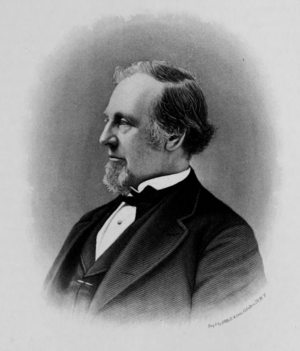Edward D. Holton facts for kids
Quick facts for kids
Edward D. Holton
|
|
|---|---|
 |
|
| Member of the Wisconsin State Assembly from the Milwaukee 4th district |
|
| In office January 11, 1860 – January 9, 1861 |
|
| Preceded by | James A. Swain |
| Succeeded by | Charles Caverno |
| Personal details | |
| Born |
Edward Dwight Holton
April 28, 1815 Lancaster, New Hampshire |
| Died | April 21, 1892 (aged 76) Savannah, Georgia |
| Resting place | Forest Home Cemetery Milwaukee, Wisconsin |
| Political party | Republican Free Soil (before 1854) Liberty (before 1848) |
| Spouse | Lucinda C. Holton |
| Children | Harriet (Robertson) (b. 1851; d. 1941) |
| Relatives | Timothy Dwight Holton (grandfather) |
| Occupation | Merchant, railroad promoter, banker |
| Known for | Abolitionism, temperance, Republican Party co-founder, namesake of Holton, Kansas |
| Signature |  |
Edward Dwight Holton (born April 28, 1815 – died April 21, 1892) was an important leader in Wisconsin during the 1800s. He was involved in both politics and business.
Holton was the first sheriff of Milwaukee. He also served in the Wisconsin State Assembly. Even though he didn't hold the highest offices, he helped shape the early development of Wisconsin. He was a candidate for governor in a key election in 1857. He was also well-known for his strong beliefs in abolitionism (ending slavery) and temperance (reducing alcohol use). His work in banking, railroads, and insurance also helped Wisconsin grow.
Contents
Early Life and Moving West
Edward Holton was born in Lancaster, New Hampshire. From a young age, his mother raised him alone. When he was 14, he became an apprentice clerk for four years. This meant he worked for someone to learn a trade.
He went to public schools and later became a teacher. After his apprenticeship, he taught for a year in Lancaster. His good skills in business led him to a job in Buffalo. He worked there as a bookkeeper for a company that shipped goods.
In 1838, he visited the new Wisconsin Territory. He returned home because the real estate market was struggling. But in 1840, he decided to settle in Milwaukee for good.
Building Businesses in Wisconsin
Milwaukee Merchant
In November 1840, Edward Holton opened his first store. It was in a corner of a warehouse. Soon, he became involved in the growing wheat business. In 1841, he was the first person to ship wheat from Milwaukee's port.
Milwaukee's wheat exports grew very quickly. In 1841, they were small. By 1845, they reached 95,000 bushels. In 1849, they hit 1.1 million bushels! This trade helped Holton become very successful. In 1849, he helped start the Milwaukee Board of Trade. He became its president. This group helped organize the wheat trade.
Railroads
In 1849, Holton also helped create the Milwaukee and Prairie du Chien Railroad. He worked as its superintendent until 1851. This helped connect different parts of the state.
Banking and Other Ventures
In 1853, he helped form the Farmers and Millers Bank. This bank later became part of Firstar Corporation. Holton was its first president. At this time, banking rules were very confusing. Holton played a key role in writing new laws to make banking clearer and more stable.
Political Work in Wisconsin
Fighting for Change: Abolition and Temperance
For a while, Edward Holton was a trustee for Milwaukee when it was a small village. In 1843, he was elected Milwaukee's first sheriff. He ran as an independent candidate.
Early in his political life, Holton was known for his strong views. He was an abolitionist, meaning he wanted to end slavery. He was also a temperance advocate, meaning he supported reducing or stopping alcohol use. These views were often unpopular at the time. However, he won against William A. Barstow, who later became governor. This was partly because Barstow's own political party was divided.
In 1845, Holton ran for Congress. He was the candidate for the Liberty Party. He lost to Morgan Lewis Martin.
Running for Governor
Holton was the candidate for governor in 1853. He ran for the Free Soil Party. He lost to William A. Barstow again. But he finished much stronger than the Whig Party candidate.
Helping Start the Republican Party
In 1857, the Wisconsin Republican Party was still very new. Edward Holton was one of the main candidates for governor at their convention. The other main candidate was Walter D. McIndoe.
Holton's strong anti-slavery beliefs and his connections in Milwaukee gave him a lot of support. But McIndoe's personality appealed more to people living on the frontier. Because of this, neither candidate could get enough votes to win. The delegates eventually chose a third candidate, Alexander Randall. Randall became the first of many Republican governors in Wisconsin.
Holton served in the Wisconsin Assembly in 1860. He represented the Fourth Ward of Milwaukee. In 1862, President Lincoln chose him for a special job. He became an "allotment commissioner." His job was to make sure that one-third of each Union soldier's pay was sent home to their families. This helped families and prevented soldiers from spending all their money in camp. He had to leave this job because of poor health.
Later Years and Travels
After leaving his commissioner job, Holton lived a quieter life on his farm. In 1871, he took a position with Northwest National Life Insurance. They needed his help managing claims after the Great Chicago Fire. During this time, he also served on the National Board of Trade. He was also on the board of directors for the International Board of Lake Underwriters.
In 1879, he took a train trip to California. He stopped in Holton, Kansas, a town named after him. In California, he visited Yosemite Park. He rode a horse there in early spring, even though the trails were difficult due to snow.
He stayed active in the business world, even if he wasn't running daily operations. He died in Savannah, Georgia. He was on his way back to Milwaukee after visiting Florida.
Family Life
Edward Holton married Lucinda Millard on October 14, 1845. They married in Dexter, Michigan. Lucinda was a distant cousin of President Millard Fillmore. When Edward died, he was survived by Lucinda and their three adult daughters. One daughter, Mary, married Robertson James. He was the brother of the famous writer Henry James.
Legacy
Holton, Kansas, is named after Edward Holton. Also, Holton Hall at the University of Wisconsin–Milwaukee is named for him. In Milwaukee, Holton Street and the Edward Holton Viaduct are also named in his honor.
Images for kids
 | Janet Taylor Pickett |
 | Synthia Saint James |
 | Howardena Pindell |
 | Faith Ringgold |


